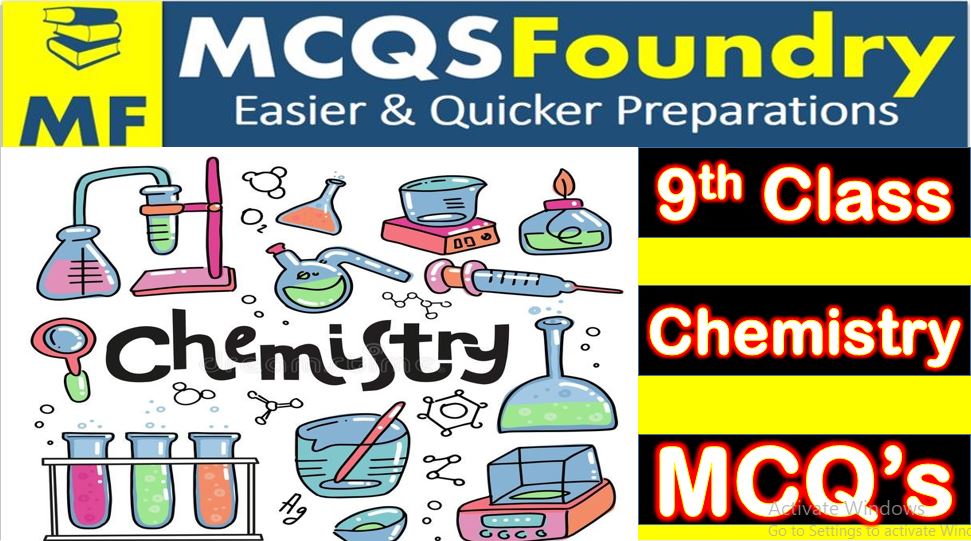MCQsFoundry.com brings to you 500+ 9th Standard Chemistry Mcqs which are new and latest. These Mcqs are never published on internet so far. For full information about all PPSC / FPSC / CSS / PMS latest jobs visit theiteducation.com

| 01 | 9th Class Chemistry Mcqs Chapter 01 | 02 | 9th Class Chemistry Mcqs Chapter 02 |
| 03 | 9th Class Chemistry Mcqs Chapter 03 | 04 | 9th Class Chemistry Mcqs Chapter 04 |
| 05 | 9th Class Chemistry Mcqs Chapter 05 | 06 | 9th Class Chemistry Mcqs Chapter 06 |
| 07 | 9th Class Chemistry Mcqs Chapter 07 | 08 | 9th Class Chemistry Mcqs Chapter 08 |
| 09 | 9th Class Chemistry Mcqs Chapter 09 | 10 | 9th Class Chemistry Mcqs Chapter 10 |
| 11 | 9th Class Chemistry Mcqs Chapter 11 | 12 | 9th Class Chemistry Mcqs Chapter 12 |
CHAPTER NO 7
Electrochemistry
Encircle the most appropriate answer among the following options
1 Symbol of hydronium ion is:
(a) H+
(b) OH–
(c) H30+
(d) none of these
2. An example of non electrolyte is:
(a) Glucose
(b) aq NaCl
(c) HCI
(d) H2SO4
3. An example of weak electrolyte is :
(a) HNO3
(b) HCI
(c) H2SO4
(d) H2CO3
4 During electrolysis takes place at anode.
(a) Catenation
(b) oxidation
(c) reduction
(d) addition
5 Which is not the characteristic of electrolyte?
(a) Cheap
(b) conductor
(c) easily oxidized
(d) soluble in water
6 In dry cell_ acts as cathode:
(a) Zn cup
(b) graphite rod
(c) paste
(d) steel rod
7 In Zn-Cu galvanic cell, Zn is dipped in:
(a) ZnSO4
(b) Zn(NO3)2
(c) CuSO4
(d) both a & b
In Zn-Cu galvanic cell, Zn is used as:
(a) Cathode
(b) anode
(c) electrode
(d) all of above
9 In Zn + Cu+2 → Zn+2 + Cu, Zn is:
(a) Oxidized
(b) reduced
(c) redoxed
(d) decomposed
10 Anions are ions.
(a) Positive
(b) neutral
(c) negative
(d) amphoteric
11 Cations are ions.
(a) Negative
(b) positive
(c) neutral
(d) none of these
12 Electrolysis of NaCl is done in the cell:
(a) Electrolytic
(b) voltaic
(c) down’s
(d) faradays
13 Which one is not produced during electrolysis of aqueous NaCl?
(a) Na+
(b) OH–
(c) H2O
(d) Cl–
14 In pure water, out of only one molecule ionizes.
(a) 6 x 106
(b) 6 x 108
(c) 6 1016
(d) 6 x 1012
15 Which one is weak electrolyte?
(a) Citric acid
(b) carbonic acid
(c) tartaric acid
(d) all of these
16 Metallic, ammonium and hydrogen ions carry_ _charges.
(a) Negative
(b) neutral
(c) positive
(d) partial positive
17 Electrode through which electrons enter the external circuit:
(a) Anode
(b) Cathode
(c) electrode
(d) none of these
18 Electrode through which electrons leave the external circuit:
(a) Anode
(b) Cathode
(c) graphite
(d) electrolyte
19 Which one is conductor?
(a) Naphthalene
(b) paraffin wax
(c) plastic
(d) HCI
20 Which solution is not a conductor:
(a) NaCl
(b) K1
(c) CO (NH2)2
(d) CuCl2
21 Rods through which electric current enters or leaves the cell:
(a) Protons
(b) electrons
(c) electrodes
(d) all of these
22 Spontaneous redox reaction produce current in:
(a) Voltaic cell
(b) electrolytic cell
(c) galvanic cell
(d) Both a & b
23 In an oxidation reaction electrons are:
(a) Absorbed
(b) lost
(c) moved
(d) increased
24 In reduction reaction electrons are:
(a) Lost
(b) absorbed
(c) kept constant
(d) all of these
25 Which of the following is a good electrolyte?
(a) NaCl
(b) H2SO4
(c) NaOH
(d) All of these
26 Which ionizes in small extent in water
(a) Ca(OH)2
(b) NaCl
(c) NaOH
(d) H2SO4
27 Oxidation always takes place at
(a) Anode
(b) Cathode
(c) Both of them
(d) Nome of them
28 Who invented first electrolytic cell?
(a) Berzelius
(b) Volta
(c) J. Dalton
(d) Newton
29 In galvanic cell, cathode carries.
(a) Positive charge
(b) Negative charge
(c) No charge
(d) Neutral charge
30 Cl2 gas is formed, when CI ions are
(a) Reduced
(b) Oxidized
(c) Removed
(d) Reacted with metals
31 Which ion is not formed during is of aqueous sodium chloride?
(a) H+
(b) H2
(c) Cl2
(d) NaOH
32 Which medium accelerates the process of rusting?
(a) Acidic
(b) Basic
(c) Buffer
(d) Neutral
33 Stainless steel contains
(a) Nickel
(b) Iron
(c) Chromium
(d) All of these
34 Which of the followings is a corrosion resistant metal?
(a) Fe
(b) Zn
(c) Sn
(d) Sr
35 The electrolytic cell is made up of
(a) Cement
(b) Glass
(c) Wood
(d) All of these
36 Which of the following is a common example of silver plating?
(a) Wares
(b) Cutlery
(c) Jewellery
(d) All of these
37 Which metal has a great tendency to corrosion?
(a) Silver
(b) Copper
(c) Aluminum
(d) All of these
38 Chemical formula of sodium thio-sulphate is
(a) Na2SO4
(b) Na2SO3
(c) Na2S2O3
(d) NaSO4
39 Sterling silver is an alloy of silver and
(a) Iron
(b) Copper
(c) Chromium
(d) Aluminium
40 In HCl, oxidation number of H is
(a) -1
(b) +1
(c) +2
(d) -2
41 The oxidation number of all elements in free state is
(a) One
(b) Two
(c) Three
(d) zero
42 The oxidation number of Group-I elements is
(a) +1
(b) +2
(c) +3
(d) +4
43 The oxidation no of hydrogen in metal hydrides is
(a) +1
(b) -1
(c) +2
(d) -2
44 The oxidation number of oxygen is +2 in
(a) H2O
(b) OF2
(c) Na2O
(d) HNO3
45 The oxidation number of sulphur in H2SO4 is
(a) +1
(b) +4
(c) +6
(d) +8